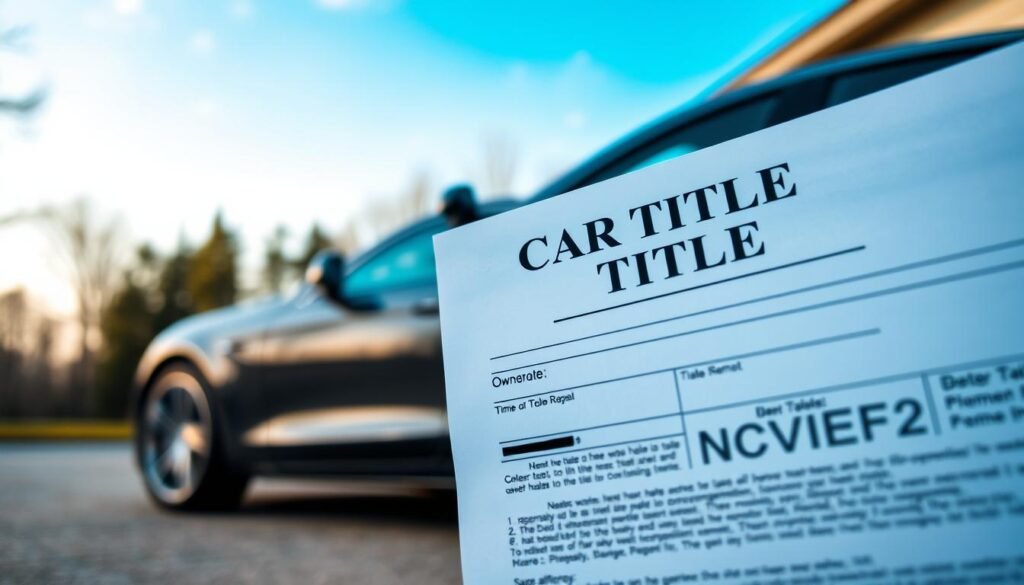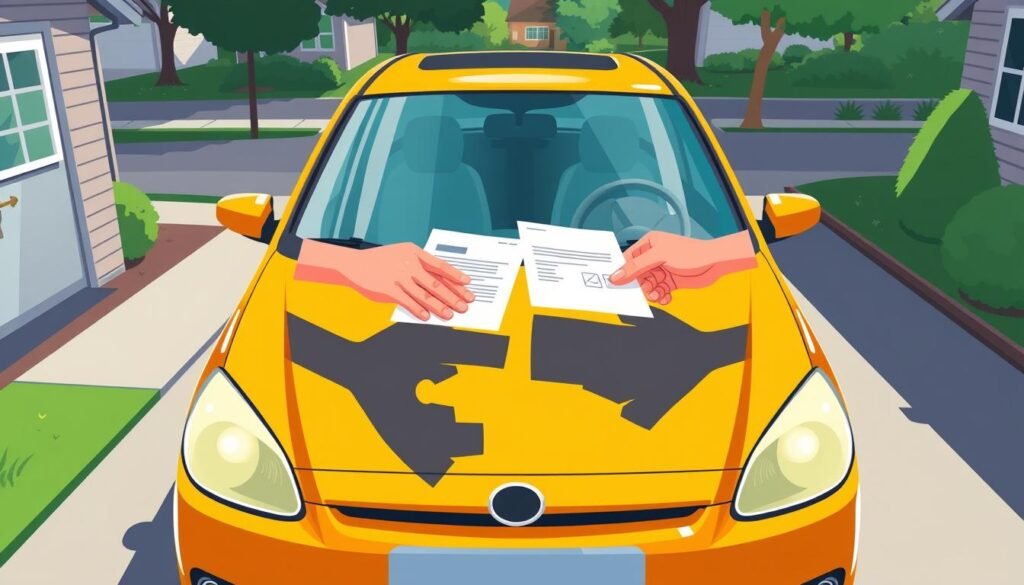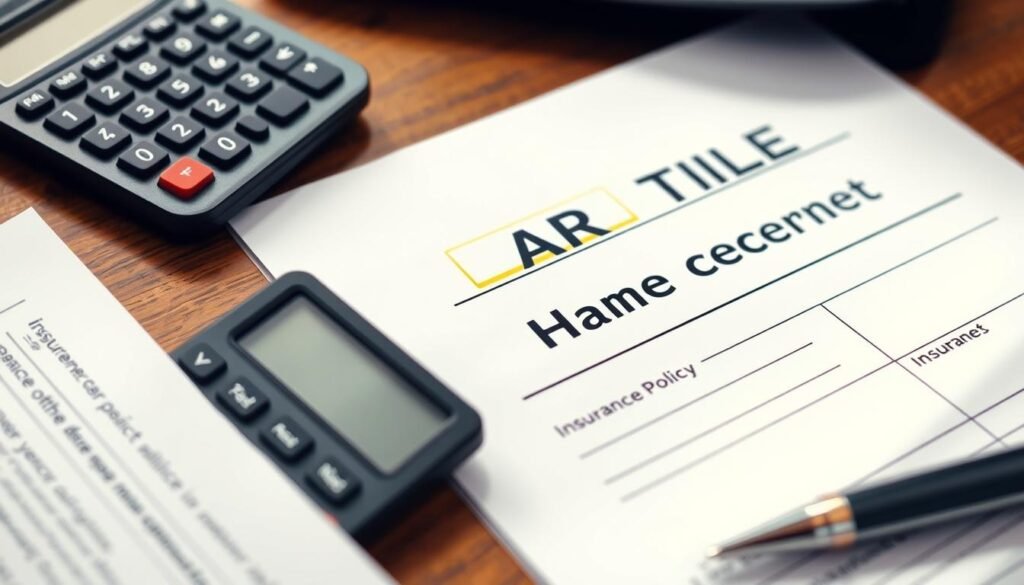Do you wonder if the name on a car title affects car insurance? Each state has its own rules for car titles and insurance. But knowing how car ownership and insurance work together is key. This ensures you have the right insurance, no matter who’s on the title.
Key Takeaways
- The named insured on an insurance policy and the titled owner of the vehicle do not necessarily have to be the same person.
- In many cases, you can insure a car that is not titled in your name, such as a car owned by a spouse or family member.
- Insurance companies may be hesitant to insure a vehicle that is not in the policyholder’s name, and some have refused to pay claims in such situations.
- The specific requirements and exceptions regarding car titles and insurance coverage can vary by state.
- It’s important to work closely with your insurance provider to ensure you have the appropriate coverage for your vehicle, regardless of whose name is on the title.
Understanding Car Titles and Insurance Requirements
What is a Car Title?
A car title is a legal paper from the Department of Motor Vehicles (DMV). It shows who owns the vehicle. The owner(s) of the car are legally responsible for it. This means they could be liable if there’s an accident.
The Role of Car Titles in Insurance
Car titles matter in insurance. Insurers might not cover a car not titled in the owner’s name. This makes claims harder and questions the owner’s interest in the car.
Having a title means you have a financial stake in the car. You can insure it under your own policy. Knowing about car titles and insurance helps get the right coverage and makes claims easier.
“Many car insurance companies are willing to provide coverage even if the car is registered under someone else’s name.”
But, if you have DUIs or accidents, insurers might not cover a car not in your name. Non-owner car insurance can be an option. It covers medical bills, damage to property, and legal costs from accidents.
Does it matter whose name is on a car title for insurance
The names on a car’s title can affect insurance coverage. But, this varies by state. In some places, the names on the car’s title and insurance don’t have to match. Insurers might still cover you even if your name isn’t on the title.
But, insurers might be more careful with a car not titled in your name. This could question your insurable interest. It could also make the claims process harder if you get into an accident.
It’s key to know what your state requires. Talk with your insurance company to make sure you’re covered, no matter who’s on the title.
| Scenario | Considerations |
|---|---|
| Car ownership in one’s own name | Requires individual insurance, may result in higher costs due to factors like credit history and insurance scoring. |
| Co-ownership or partnerships | Both individuals can often be covered on the same policy, and adding a partner may provide convenience and potential discounts. |
| Regularly driving a car not owned by you | Ensure proper insurance coverage to avoid issues in case of accidents, even if the car is not in your name. |
In 49 states, you don’t have to register and insure a car under the same name. New York is the exception. But, most insurers like the names on the insurance and registration to match. This makes the claims process easier.

After big life changes like marriage or divorce, update your car’s registration and insurance fast. Doing this right keeps you covered and avoids problems.
Insuring a Car Not in Your Name
Sometimes, you might need to insure a car that’s not yours, like one owned by a family member or friend. Most states let you do this, but each insurance company has its own rules.
Non-Owner Insurance and Listed Drivers
You can get non-owner insurance for liability when driving a car you don’t own. Or, you can be listed on the car owner’s policy. But, check the policy closely because some companies won’t let everyone be listed.
Also, think about the car’s registration. In some places, the names on the registration and insurance must match. So, if the car isn’t registered in your name, you might not be able to insure it.
| Consideration | Explanation |
|---|---|
| Relationship to the Owner | Your relationship to the car’s owner, like being a family member or friend, affects the insurance rules. |
| Contractual Obligations | If the car is leased or rented, you must follow specific insurance rules in the contract. |
| Co-Titling the Vehicle | Putting your name on the car’s title as a co-owner makes insuring easier but might raise your premiums. |
Talking to your insurance company can help you get the right coverage for a car not titled in your name.

Updating Insurance for Name Changes or Ownership Transfers
If you’ve changed your name or sold your car, tell your insurance company. You’ll need to give them proof like a marriage certificate or a car title. This keeps your insurance up-to-date.
After updating your insurance, check the new documents carefully. Also, update your driver’s license and car registration with the DMV. This keeps everything in order.
Keeping your insurance and car registration current helps in case of a claims process. It makes sure you’re covered. This is a key step for name change on insurance and vehicle ownership transfer.
- Tell your insurance about the name change or car sale.
- Give them the needed papers, like a marriage certificate or car title.
- Check the updated insurance policy for mistakes.
- Update your driver’s license and car registration with the DMV registration.
- Make sure your insurance and car registration match to dodge problems with insurance policy updates.
“Keeping your insurance policy and vehicle registration up-to-date is crucial to avoid complications and ensure you have the appropriate coverage.”
By doing these things, you can easily handle the name change on insurance and vehicle ownership transfer. This gives you peace of mind and keeps your insurance smooth.

Conclusion
The name on a car’s title matters for your insurance. But, rules change by state. You might still get insurance even if the title isn’t in your name.
But, insurers might be careful. They might wonder if you really need the car. This could make claims harder later.
It’s key to know your state’s rules on car titles. Talk to your insurance company to make sure you’re covered. Update your insurance and vehicle registration if your name or ownership changes.
The car title is very important. It shows who owns the car and affects your insurance and liability. Stay informed and proactive to protect yourself and your car.
FAQ
Does it matter whose name is on a car title for insurance?
Yes, the name on a car’s title matters for insurance. But, it depends on the state. In some places, the names on the title and insurance don’t have to match. Insurers might still cover the car even if the title isn’t in the policyholder’s name.
But, they might be more careful if the title isn’t in the policyholder’s name. This can make claims harder.
What is a Car Title?
A car title is a legal paper from the DMV. It shows who owns the car. The owner(s) are legally responsible for the car. This includes being liable if there’s an accident.
They also have an “insurable interest” in the car. This means they can insure it with their own auto policy.
What is the Role of Car Titles in Insurance?
Car titles are key in insurance. Insurers might not cover a car not titled to the policyholder. This can make claims hard and question the policyholder’s interest in the car.
Can I insure a car that is not in my name?
Yes, you can insure a car not titled to you. This is often okay in most states. You might need special insurance, like non-owner insurance.
Or, you could be listed on the owner’s policy. This depends on the insurance company’s rules.
What do I need to do if I’ve had a legal name change or transferred vehicle ownership?
Update your insurance if you’ve changed your name or sold the car. Call your insurer and show them proof like a marriage certificate or a new title. Make sure your insurance is correct.
Also, update your driver’s license and vehicle registration with the DMV. This keeps everything in order.
